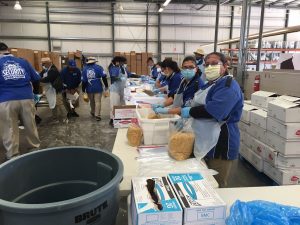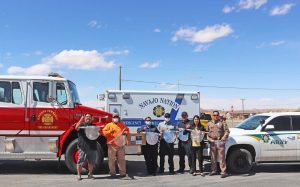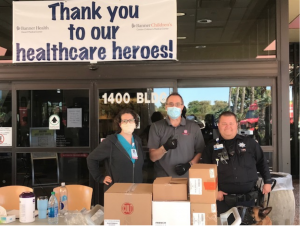- Slug: BC-CNS COVID Humaity First Responders, 1,495 words
- 3 photos and captions below.
- Video here.
By Jamie Landers
Cronkite News
The COVID-19 pandemic has led some Arizona companies to redirect their business plans in pursuit of a common goal – supporting the state’s first responders as the effects of supply shortages and other needs reverberate across the country.
Providing assistance for essential workers ranges from making personal protection equipment, such as hospital gowns and masks, to providing comfort with a morning cup of coffee.
Ultimately, the pandemic may shift some businesses in a new direction that will continue after shutdowns and social distancing ends.
Here are five Arizona businesses – and one nonprofit – with new or revived missions to give back.
Artisan Colour: Shielding health and public safety workers
The staff of Artisan Colour, a commercial printer in Scottsdale, sprinted into action when they heard protective equipment was running critically low for medical and public safety personnel.
“We have a few sewing machines and things like that for our banners and what not, but in terms of our in-house equipment, we couldn’t have a lot of staff making masks at once,” said Aaron Kilby, Artisan Colour’s vice president of sales and marketing. “We knew we needed to think outside of the box for how we could help our community.”
Instead of making traditional cloth face masks, the company purchased PETG – a polyvinyl chloride material to make reusable face shields.
“It’s clear, easy to cut, easy to use, cost effective and our guys jumped on that right away,” Kilby said. “We did some tests and it worked really well, so we were off and running.”
Kilby said an estimated 100 hours of manufacturing time will produce at least 1,400 face shields. The first set of shields were donated to Scottsdale Fire and Police departments, but Artisan Colour also has donated to local health care organizations and essential businesses, including Banner Health and the Phoenix Children’s Hospital.
Kilby said businesses of all kinds are reaching out, such as a local food-processing company and dental offices.
“The hardest part of all of this is getting our hands on the material we need,” he said. “We want to keep this going until the outbreak is over and continue to help however many people we can, but that all depends on how long we can supply (the PETG).”
Cult Artisan Beverage Co.: Pouring a morning jolt
Cult Artisan Beverage Co., a Phoenix distributor of coffee and tea, has created a new way for first responders to get their daily dose of caffeine: Cult caffeine kits, which include an assortment of the company’s specialty roasted coffees, k-cups and tea bags.
Cult’s CEO, Hans Schatz, recognizes coffee is not an “essential” good, but he said the desire for normalcy noted in a Facebook post motivated him to find a way to help out.
“We have people on the frontlines, working crazy hours, and I saw this post where this doctor said ‘I’ve got my cup, I brewed a pot of coffee, I’m filling the biggest thermos I have and I am going to face the battle … but not without my coffee.’ I thought, ‘Wait a minute … we can help with this.’”
The company delivers caffeine kits to hospitals, fire stations and police stations in the metro Phoenix every Friday. Schatz said the response has been “overwhelming at times” and shows why the impact is bigger than a business’s balance sheet.
“Even with those masks on, you can see it in someone’s eyes when they’re smiling,” Schatz said. “The people were saying, ‘This is fantastic because we really need this.’”
Schatz said these efforts helped him find a “middle ground,” as he can supply a product that not only keeps his own business running but also is a “drop in the bucket” that contributes to a “greater good.”
“We’re watching this horrific moment, but we’re watching people rise and really become unsung heroes trying to keep their own business going, but at the same time, doing things to help their community,” Schatz said. “I am truly inspired by everyone around me.”
Pride Group: Setting up temporary medical facilities
Pride Group, a Phoenix events company, said it swerved to serve as a “full-fledged disaster relief group” and has created three temporary medical facilities on the Tohono O’odham Nation lands near Tucson.
The tents have power, lights, air-conditioning and heat, restroom trailers and showers, and they can be medically partitioned, according to a company press release. In addition to treatment facilities, they made “hospital and pharmacy testing setups” with the same amenities.
Pride Group also runs a “sourcing, warehousing and distributing center” for PPE, such as N95 masks, face shields, hand sanitizer, thermometers, gloves and bleach. There is also space for bulk food and household products, including 40,000 pounds of Chick-fil-A chicken, 30,000 pounds of toilet paper and 40,000 pounds of bottled milk, the statement said.
100 Club of Arizona: Apps to protect mental health
First responders face frequent exposure to COVID-19, and many are facing the battle alone, isolating themselves for the sake of their loved ones.
The Arizona nonprofit 100 Club said the pandemic is adding stressors to a long-existing problem.
“Recent studies have found we’re losing more first responders to suicide than in the line of duty,” said Angela Harrolle, the group’s chief executive. “In Arizona, we lost 12 first responders to suicide in 12 months beginning in 2019. That’s why getting easy access to resources into the hands of first responders is so important to us at the 100 Club.”
The club provides immediate financial assistance to the surviving families of public safety officers and firefighters killed or seriously injured in the line of duty. But as the COVID-19 pandemic continues, the organization is offering two previously released mobile apps, sponsored by the Bob and Renee Parsons Foundation, to help first responders find mental health resources from a distance, according to a news release.
The Bulletproof and Fireproof apps for sworn and unsworn officers, professional staff and family members are now available, free of charge, on any iPhone or Android device. The apps provide comprehensive information, resources and referrals to help users with their mental health, physical goals, relationships and long-term financial stability, according to the press release.
“The Bulletproof app from the 100 Club of Arizona goes over and above in the number and types of resources provided,” Jerald Monahan, chief of police at the Yavapai College Police Department, said in a 100 Club of Arizona press release. “This app was built with the understanding of how hard it is for first responders who are always going to the rescue to acknowledge when they need rescued.”
In addition, there is a telehealth option for those who prefer to speak to a provider remotely due to odd work hours, residing in a rural location or quarantine.
Honeywell and Boeing: Revving up production
Honeywell, a multinational conglomerate that works in aerospace, building technologies and other areas, added 500 jobs at its Phoenix Engines campus to increase production of high-filtration N95 face masks and other PPE.
Phoenix Mayor Kate Gallego announced the news in a March 23 tweet and said the additional positions would increase Honeywell’s nationwide mask production capacity to more than 20 million a month.
Honeywell’s Phoenix Engines campus, which is on the north side of Phoenix Sky Harbor International Airport, will prioritize fulfilling the U.S government’s procurement and will be able to produce masks for states’ health care and emergency response organizations.
Masks eventually will be delivered to the U.S Department of Health and Human Services for use to support “health, safety, and emergency response workers,” according to a company-issued news release.
“We at Honeywell are proud of our role in providing essential equipment to the first responders and medical professionals we are relying on during this crisis,” Darius Adamczyk, Honeywell chairman and chief executive officer, said in a statement.
Boeing is taking a similar approach, using 3D printing technology at its Mesa facility and several other U.S. locations, to mass produce reusable face shields. The company delivered its first donation of 2,300 face shields to health care providers on April 10.
“Face shields and other PPE have been in such short supply that some doctors and nurses have turned to swimming goggles and other homemade options,” a company statement says. “Boeing worked with health care providers across the country to understand what equipment was most urgently needed and how that aligned with Boeing’s vast manufacturing capabilities.”
According to the statement, Boeing’s running production goal is to produce “thousands of face shields per week” followed by “subsequent production increases.” The U.S. Department of Health and Human Services approved the reusable face shields, and they will be distributed by the Federal Emergency Management Agency.
Boeing has added manufacturing locations in Philadelphia, St. Louis, El Segundo, California, and Huntsville, Alabama.
In addition to the face shields, Boeing has also donated tens of thousands of masks, gloves and other medical equipment to hospitals in China. The company also is making Dreamlifter, one of the largest air cargo transporters in the world, available to quickly transport emergency supplies to wherever needed.
For more stories from Cronkite News, visit cronkitenews.azpbs.org.
^_=


